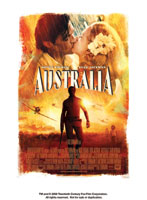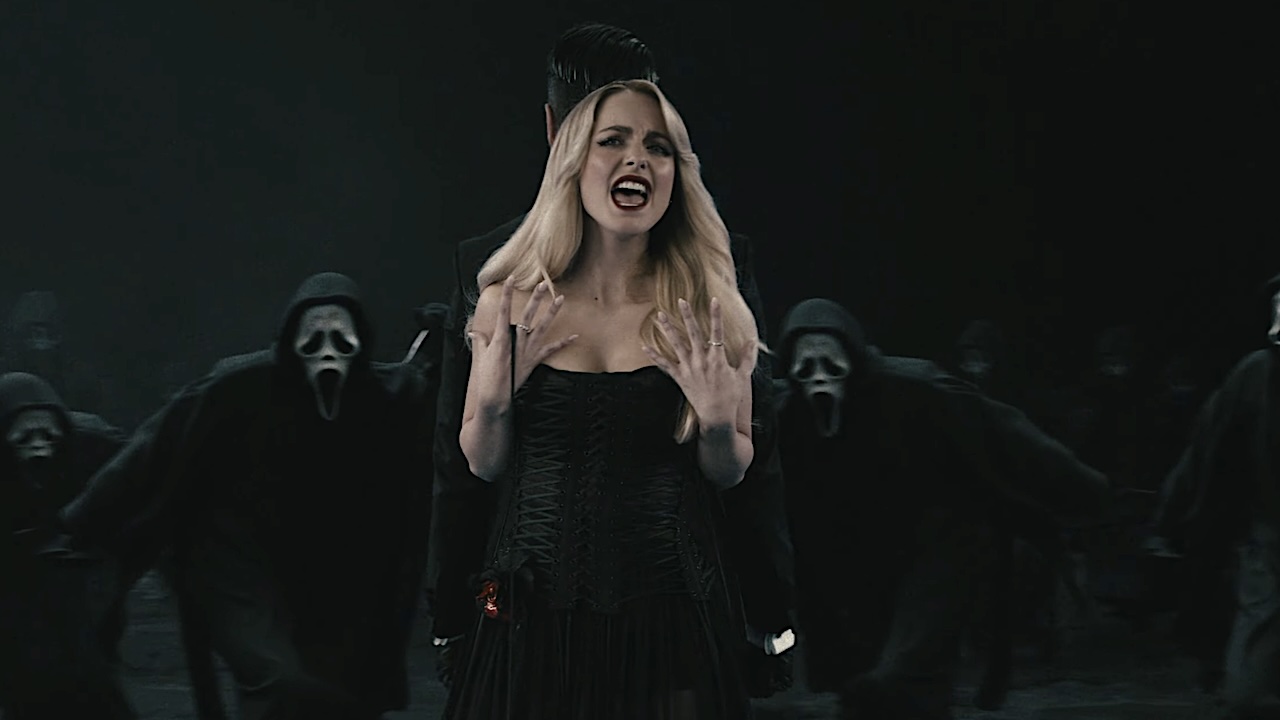Australia, as a movie experience, demands ushers in red vests, plush velvet seats, bunched curtains and a balcony. It is as much a tribute to movies as it is a movie itself; like all Baz Luhrmann films, it's intoxicated with the very notion that it will flicker to life on a screen. Set loose in the limitless wilds of his homeland, Baz Luhrmann stuffs the screen with dust storms, sunsets, stampedes, explosions, kangaroos, cliffs, and perhaps Australia's greatest wonder of all, Hugh Jackman.
It sounds like a mess because it is one. A gorgeous, earnest, reckless, and brazenly captivating mess, nearly three hours of pure entertainment, but a jumble rather than a clear love letter to home. The title is more than just sass; Luhrmann really seems to be aiming to capture his entire home country, and perhaps inevitably, he's gotten a little lost along the way. The Wizard of Oz metaphors and political talk and sweeping scenery are all wonderful on their own, but crammed together they amount to less than a simpler movie might have. The entertainment value is undeniable; the artistic achievement, less so. Though it's being sold as a war-torn romance, Australia is more like a coming-of-age story, for both the stuffy English aristocrat Lady Sarah Ashley (Nicole Kidman) and the young half-Aboriginal boy, Nullah (Brandon Walters), who comes under her care. At the time the movie is set, 1939, the Australian government would forcibly remove half-Aboriginal children from their mothers, in a misguided attempt to assimilate them into white culture. Nullah is hiding from the law on the Ashley cattle ranch, Faraway Downs, when Lady Sarah arrives in a huff to find her wayward husband.
She's there with the notion of dragging him back to England and selling the place, but finds him dead instead. Ranch hand Fletcher (David Wenham) is soon revealed to be the traitor, helping siphon off cattle to neighboring beef baron Carney (Bryan Brown) and collecting a profit for himself. Impulsively, Sarah decides to compete with Carney instead, which requires driving the cattle 1,500 miles to the port city of Darwin. To do this, she has to team up with the man known only as the Drover (Jackman), the rough-hewn Australian equivalent of a cowboy who picked Sarah up from Darwin and, of course, has come to hate her guts. They're joined by a motley crew on their brutal journey, and on campfire nights under starlit skies, you can imagine what happens next.
And that's just the first half. Australia is a flagrantly long epic that grows constantly, almost unbelievably in length. Nullah's coming-of-age, guided by his mystical grandfather King George, pops up as one plot thread, and then we run with Sarah and the Drover's crackling romance for a while before the politics of the beef industry and Darwin's high society take over. In the second half Sarah, the Drover and Nullah have settled into a kind of domestic bliss, but the inevitable conflicts of relationships and the approaching war scatter everyone before reuniting during the explosion-filled conclusion.
The action set pieces are each spectacular, particularly a cliffside stampede near the beginning and a covert ocean rescue near the end. Jackman is probably the most spectacular of them all, in tight pants and frequently shirtless, riding horses and cracking whips and, in one scene, showering. Rarely has a male lead ever been filmed so lovingly by a director, and while Kidman looks great in her costumes and commits herself to the action, she never stands a chance against Jackman's biceps.
Sarah and the Drover amount to nothing as characters, despite Kidman and Jackman's chemistry. The characters are archetypes that no actor-- not even Meryl Streep in Out of Africa-- has been able to do much with in the past, so Kidman and Jackman deserve credit for at least having fun whlie doing it. Luckily they've got Walters to back them up, a sparkplug of a newcomer whose character-- a magical Aborigine-- could have killed the movie if not played perfectly. The story is most alive when it leans toward Nullah's story, and had Luhrmann ditched the generic white lovers at the center, he may have had something truly extraordinary on his hands.
Not that we'd really want him to, given how many gorgeous, swoony moments we experience with Sarah and the Drover. Luhrmann has tamped down on the visual, romantic excess that made Moulin Rouge! such a spectacle and translated it into sweeping shots of the landscape; Mandy Walker's cinematography is stellar, but only the heightened romantic moments feel truly like Luhrmann. The central romance is successful if a bit empty, given how much it relies on the usual archetypes of the beautiful city girl and the rough cowboy. There's a fine line between something universal and something tired, and Australia too often comes close to the latter.
Your Daily Blend of Entertainment News
A deliberate throwback to the days when going to the movies was an all-day experience, Australia provides, minute by minute, the most movie of anything onscreen this year. Not too arty and not too dumb either, it offers plenty to enjoy, but nothing to think about when it's over. If audiences still flock to see movie spectacles-- and this may be the test of whether they do-- they will be satisfied, perhaps thrilled, by Australia, even if it's not what the most optimistic of us hoped it could be.
Staff Writer at CinemaBlend


